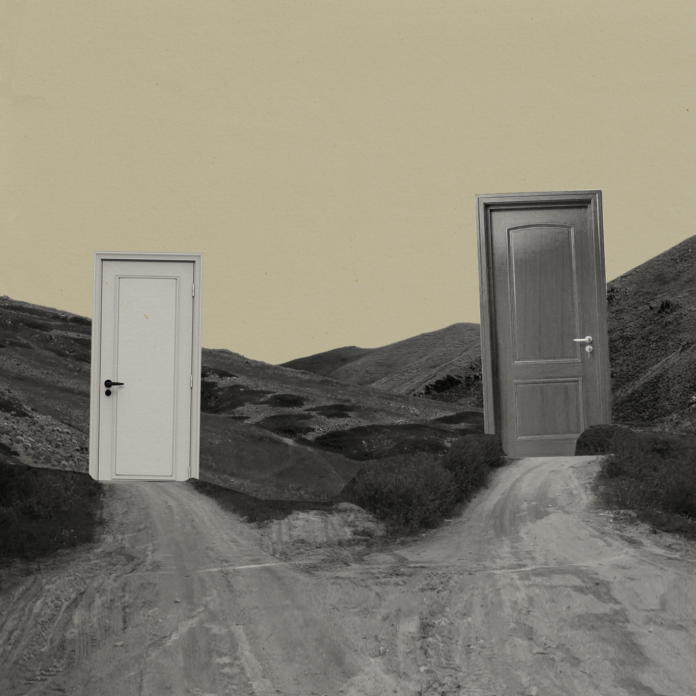The difference between camp and kitsch is that camp knows death and kitsch doesn’t. Don’t laugh. People can be sorted into these two teams but the assignations are fluid and often the sorting is done wrong. Categorization can be influenced by upbringing, too much sun, poor eyesight, sobriety, religiosity, hunger, striving, false idols, a lack of knowing any classification is afoot. Often a kitscher will recognize a camper incorrectly as one of their own; so often the search is for one’s self in another. Kitschers have heaven, swaying fields, maybe even God. Campers have dirt.
My wife is neither; I am always one or the other. Of her beliefs, I couldn’t tell you with any certainty. She knows death though. Has lost a mother and a grandmother, not in that order, one death each time she was pregnant. I wouldn’t know what that is like. Maybe I can’t tell you of her beliefs but I will give some of who she is with the following two-word sets: colossal reticence, unwavering mom, weary partner.
You get these questions as a parent. Difference between big and bigger, giant and huge, large and very tall, taller. You make up answers, you say words, you attempt to say words and stay in the present, saying words, attempt to physically plant yourself close enough to be heard by the little ears, and not have your head, hands, thoughts, feet, anywhere else, or moving in a way that is drifting into the next. You fail. I fail! I say words walking into the next room, towards my phone, to find my coffee, my beer, the dishes, the rag, the remote, my beer, and I say the difference is negligible. Either word works. Any words work. And yet, I definitely have a belief on that subject, and it is that usually the words don’t work. When a word does work, it is because it is the right one, and not the wrong one. The wrong ones exist. Very much so.
A question I got as a husband is how I could watch Batman, meaning Adam West’s, while being accused (she would not use that word) of cheating. Infidelity is actually what she’d said; “emotional infidelity.”
“Why does that matter?” I said, solemn like a boy.
“I think it makes most sense, what I’m saying is, turn off the TV.”
I did and then reflexively tried to linger in what had already been said, talking about whether Julie Newmar or Eartha Kitt onscreen would be more appropriate for this conversation, obviating Lee Meriwether, instead of answering the initial actual foray into conversation: “Do you think texting another woman all day, regardless of what is being said, is emotional infidelity?”
These words did not sound like her own. She’d either discussed with a friend her dilemma or searched words like “emotional betrayal husband,” or “texting another woman limitation,” or “phone cheating no sex no pictures” or both. It was both. I could sense her attempt at complete preparedness in the quality of her attention.
My wife was wearing what she called “no face” meaning her hair was in a low ponytail, no makeup, her bedroom glasses, and not recently showered. A lesser woman would dress for the conversation. Our kids were in the room, on the far end of living room, a space that was divided only by their gymnastic-padding furniture standing on its side to form stunted tunnels, and assorted pillows stacked like deep frame Wonka set pieces. Their music was going and we were sitting much closer than normal, so if they could hear us, it would have been the joint revelation of a superpower.
She waited for me to be done with my bullshit.
“Are you cheating on me?”
“If it feels that way to you. That’s what matters. I’m sorry.” Her face reflected the two word sets and another: substantive doubt.
She said, Ok.
I turned the TV back on. Burgess Meredith was grinning and waddling. I tried to remember where my phone was. I glanced toward the kids, they were immersed. Knowing what to do, how to be, is nothing. Like intentions. Mistakes layer in a relationship and form new land, terra firma, and the problems with that reality, its solidity, are myriad. Many live in denial that their lives have changed, that the land they live on is new, unsteady, of their own creation, but also absolutely real. I’m sure. Don’t mistake recognition of change, of missteps and passivity, as wisdom. Recognition is nothing. I have the ability to move towards her. I won’t do it. I’ll try to invent a middle way, a set of behaviors, that will seem to her to be my apology; but that won’t ultimately change anything. We’ll continue on hazily. The only difference in people that matters is that some know death and others don’t.


